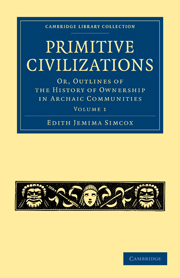CHAPTER II - PREHISTORIC PROBLEMS
Published online by Cambridge University Press: 07 September 2011
Summary
The general resemblances between China, Egypt, and the kingdoms of Mesopotamia have been noticed by many writers, who regard them as accidental, or at least as the result of similar, not identical antecedents. The interest of their history does not depend on the community of their origin; but, as the study of their social and economic systems certainly tends to accentuate the resemblances, it is reasonable also to enumerate the considerations which favour the hypothesis of such an origin. The history of prehistoric times is blocked out, after a fashion, when every hypothesis is excluded which runs counter to sound linguistic, ethnological, or geographical data. And a certain presumption remains in favour of any theory which is not proved to be inconsistent with any of these three sets of conditions.
There is documentary proof that the art and the ethnological features of the earliest inhabitants of Egypt and Babylonia resembled each other, to an extent which can most easily be explained on the supposition of a near relationship between the two peoples. Such a relationship would be readily accepted, notwithstanding their geographical separation, were it not for the fact that they belong linguistically to two distinct families. But this objection itself loses its force, as the linguistic affinities of the Egyptians are any way with the tongues of Asia, not those of Africa; and on that ground alone the balance of opinion among scholars is in favour of their having migrated from the earliest settled parts of the former continent.
- Type
- Chapter
- Information
- Primitive CivilizationsOr, Outlines of the History of Ownership in Archaic Communities, pp. 14 - 34Publisher: Cambridge University PressPrint publication year: 2010First published in: 1894



